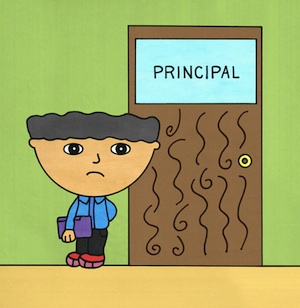Parent teacher communications are tough, no doubt. Here’s how to deliver news that could bring out the momma bear claws if you aren’t careful.
The other day I was talking to my kids’ swim coach after practice. She is in school to become a teacher and asked me what one piece of advice I could give her before starting student teaching in the fall.
Hmmm…that’s a good question. With a lot of good answers that are certainly important.
Talking to parents about their children is one of the hardest things we teachers do. Sure, it’s easy when everything is going well. Everyone loves to deliver and hear good news.
But the reality is that often teachers have to deliver information we wouldn’t want to hear about our own kids.
The worst ones, I think, are when you have to call about issues that aren’t academic. Usually we have good documentation to support those type of calls (or we should have). Although I have lost friendships over academic and learning-issues discussions, the non-academic things are so much more personal. You are having to talk about things that really aren’t a teacher’s business, but they impact the classroom so it can’t be avoided.
Bed bugs, how to talk to parents about lice, hygiene…these discussions stink. I hate them, to be honest. Like you, I also don’t want to get lice, take home bed bugs or any other creepy crawly that might be lurking on a child’s coat or hair. Big yuck.
So what do you do when it’s not really an academic or classroom management issue?
Here is just one example of parent teacher communications I had to have over the years that completely sucked. The stories are all the same generally. It’s just that this one had everything in it.
How did it turn out? Pretty good, actually because of one thing I always do (more on that after the story).
I once had a student who smelled terrible. She was also clinically obese. This child would sit in her seat and heave trying to breathe, and although she was only in elementary school she already had breasts but didn’t wear a bra.
It was strange because her mother was thin, well dressed and clean.
There were days when the smell was so bad I couldn’t even stand to work with the child, and other kids didn’t want to be in a group with her.
Then came the lice…and the bite marks on her arms from bed bugs.
Eventually I had the mother come in and we talked point blank about hygiene, how to treat lice and clean for bed bugs, the necessity of a proper diet and why her daughter needed a bra. We also talked about getting some proper pants so when she bent over we wouldn’t all have to see her “crack.”
We also talked about how to check if your child is washing correctly – with soap (I have three boys and I know they try to get away with just jumping in the shower, getting wet and hopping out). I literally had to discuss about lifting up the folds of her stomach and being sure she washed thoroughly “down there.”
Really?
Oh yes. It was a long parent teacher conference.
I was very blunt in it. I even talked to the mother about how I didn’t want to take lice home to my children and how other kids in class shouldn’t have to worry about it either.
It had to get personal about how other kids were reacting to her daughter too. They didn’t want to work with her because she smelled so badly, and I couldn’t blame them.
But everything turned out really well. The mom cried, I felt bad, but nobody got angry and called the school board. How did I do it?
A little bit of prep at the beginning of every year. Or if you have a student move in, be sure to do this for the first few weeks:
Focus on only making only positive phone calls and interactions with families for the first month of school. Every student should receive multiple high fives from the teacher for anything you can find.
Yes, I know that’s hard. Sometimes you have to really think about what you can say for some kids. But find it and do it – even if it is just something like, “Johnny sat and listened to the story for a whole 10 minutes today. He won the classroom award for being the best listener!” Or, “I’m so impressed with the healthy snacks you send with Suzy every day. Thanks for taking the time to do that.”
These types of initial parent teacher communications make a world of difference when the bad news comes. It won’t save every relationship, but for most of them it helps a great deal.
Of course it also makes a difference in how you say things. A bit of tact goes a long way.
What about you? What do you think is the hardest thing to talk to parents about? Leave a comment below.
